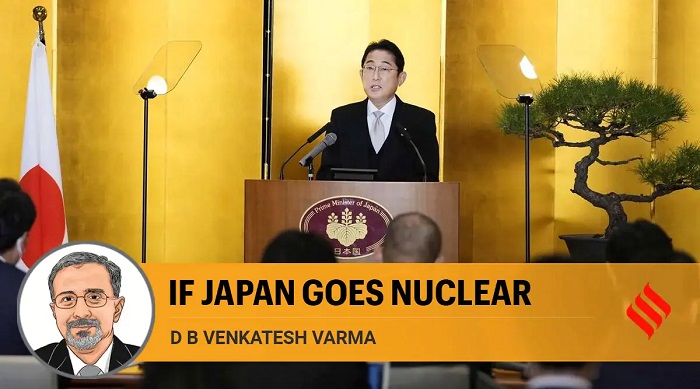
Japan’s National Security Strategy released in December is a remarkable document. Russia’s invasion of Ukraine, China’s assertive rise, and DPRK provocations are listed as key developments creating for Japan the most severe and complex security environment since the end of the Second World War.
Japan’s response – the document states with the tranquillity of a sober tea ceremony– will be to build comprehensive national power, reaffirm the security alliance with the US, develop autonomous capabilities through a sustained military build-up, procurement of deep strike weapons and investing in the Indo-Pacific and the Quad.
On the surface, the new Strategy has nothing startlingly new to offer. However, probing beneath for the pulse of the understated, Japan’s new concerns – the inadequacy of its current defence posture and its military alliance with the US to measure up to future security needs — echo through the document, mildly but with the certainty of the heartbeat of a newborn baby.
Unconstrained by bilateral or multilateral agreements, Chinese military power is noted as growing exponentially. In less than a decade, the Chinese nuclear arsenal would match numbers currently held by the US and Russia. Expectations are low that the US would have the will or the capacity to bring China to the arms control table.
DPRK is riding a runaway proliferation train. Having shaken off all the limits to its nuclear programme it pretended to accept during the Trump Administration, its nuclear programme is perhaps now unstoppable. Ballistic missile tests, conducted with the scantest regard to international reaction, have overflown Japanese airspace. The mood in South Korea is despondent but slowly turning in favour of its own nuclearisation.
As underlined by the document, extended deterrence including nuclear weapons is the cornerstone of the US-Japan alliance. Its success until now allowed Japan the luxury of its three nuclear no’s policy – no production, possession, or introduction of nuclear weapons on its territory. But it was never truly tested in Asia, as US nuclear superiority over China was largely uncontested. Now it is no longer so, and will be less so in the future.
Japan has no reason to question the validity of its security alliance with the US. What perhaps worries Japan is its future adequacy. The options going forward are three – one stated and two unstated.
The National Security Strategy calls for Japan to strengthen the deterrence and response capabilities of its alliance with the US, including extended deterrence by the US, backed by its full range of capabilities, including nuclear. This is the stated position, not very different from previous Japanese pronouncements on the subject. Ukraine’s sorry plight about security assurances – provided by Russia in the past and the US in the current war — would not have gone unnoticed in Tokyo.
The unstated part is the possibility of nuclear-sharing by Japan. If implemented, this may be new to Asia but is a long-standing US practice with its key NATO allies in Europe. US willingness to share nuclear-powered submarines with Australia as part of AUKUS is an indicator of possible trends.
The second unstated option is the possibility of Japan itself acquiring nuclear weapons. The document makes no reference to this. But there are references to the US – in Japan’s view the “world’s greatest comprehensive power” finding it increasingly “difficult to maintain a free and open international order”. Behind Japanese politeness, the message is clear.
Significantly, the document adds that Japan would seek to strengthen its defence capabilities to the point at which Japan is able to take “primary responsibility” for its defence, without excluding support from the US. These are the green shoots of strategic autonomy, Japanese style.
Japan’s turn towards an explicit nuclear option will come, if at all, not out of choice but out of necessity. Its strategic predicament, laid bare by the document, is compounded by the lack of easy answers, a predicament that India should view with sympathy and understanding of a fellow Asian country.
As the only country the target of two nuclear bombings, public sentiment runs deep against Japan acquiring nuclear weapons. Japan is also a strong supporter of the NPT, and its derivative non-proliferation regime but it is also painfully aware that the NPT does precious little to constrain China, nor for that matter DPRK.
The gap between Japan’s security needs in a nuclearised world and its non-nuclear public sentiment was papered over in the past by US extended deterrence. It looks less likely that will be the case in the future.
If Japan goes nuclear, India should welcome the decision.
In our separate ways, India and Japan privileged nuclear disarmament as a priority. But there comes a time when this national preference must be subordinated to the demands of national security.
India reached this conclusion reluctantly but with good reason in 1998. If Japan were to reach the same conclusion, it too would have good reason to do so. Its technological capabilities are not in doubt. It is for Japan to exercise its inherent and inalienable right of ensuring the necessary means of self-defence. Thinking the unthinkable in terms of changing policy is an attribute of sovereignty, not its negation.
A multipolar Indo-Pacific can be truly multipolar only if Japan is assured of national defence through the means of its choosing. As a strategic partner and friend, we must keep faith that Japan will make the right decision at the right time.
The writer is former Ambassador to the Conference on Disarmament, to Spain and Russia. Views are personal (Indian Express)


